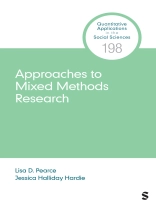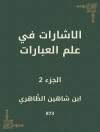Approaches to Mixed Methods Research focuses on the choices social scientists make when designing a study that mixes quantitative and qualitative data. Authors Lisa D. Pearce and Jessica Halliday Hardie explore ways to weave together strands of research using qualitative and quantitative data to speak to and enhance each other; a strand being a series of steps involved in collecting and analyzing a single type of data. The result, they show, is a more holistic body of evidence that emerges, and they illustrate this with examples from a wide range of studies from the United States and other countries.
विषयसूची
Series Editor Introduction
Acknowledgments
About the Authors
Chapter 1: What Is Mixed Methods Research and Why Use It?
The Field of Mixed Methods Research
Clarifying Some Terminology
Overview of the Book
Chapter 2: Developing Research Questions and Hypotheses in Mixed Methods Research
Predetermined Research Questions or Hypotheses for Mixed Methods Research
Emergent Research Questions or Hypotheses in Mixed Methods Research
Application Exercises
Chapter 3: Sampling and Case Selection
Sampling in Concurrently Designed and Collected Mixed Methods Projects
Sequential Sampling in Mixed Methods Projects
Application Exercises
Chapter 4: Combining Methods to Improve Data Collection Tools
Improving Quantitative Data Collections With Findings From Qualitative Data
Results From Quantitative Data Informing the Collection of Qualitative Data
Hybrid Data Collection Tools
Application Exercises
Chapter 5: Integrating Quantitative and Qualitative Data in Analysis and Interpretation
Rationale for Mixing Data Analyses
The Process of Integrating Different Data Analyses
Application Exercises
Chapter 6: Challenges and Rewards in Mixed Methods Research
Common Issues in Mixed Methods Research
When to Use a Mixed Methods Approach (or Not)
Rewards of a Mixed Methods Approach
What the Future Holds
Application Exercises
Appendix: Mixed Method Studies by Chapter
References
लेखक के बारे में
Jessica Halliday Hardie is Professor of Sociology at Hunter College, City University of New York. She is a faculty affiliate and current Interim Associate Director at the CUNY Institute for Demographic Research. Hardie specializes in the areas of inequality, family, health, education, work, social demography, and the transition to adulthood. She is the author of Best Laid Plans: Women Coming of Age in Uncertain Times, published by the University of California Press. Her work has appeared in journals such as Social Forces, Journal of Marriage and Family, Sociology of Education, Social Problems, Socius, and Journal of Health and Social Behavior.












